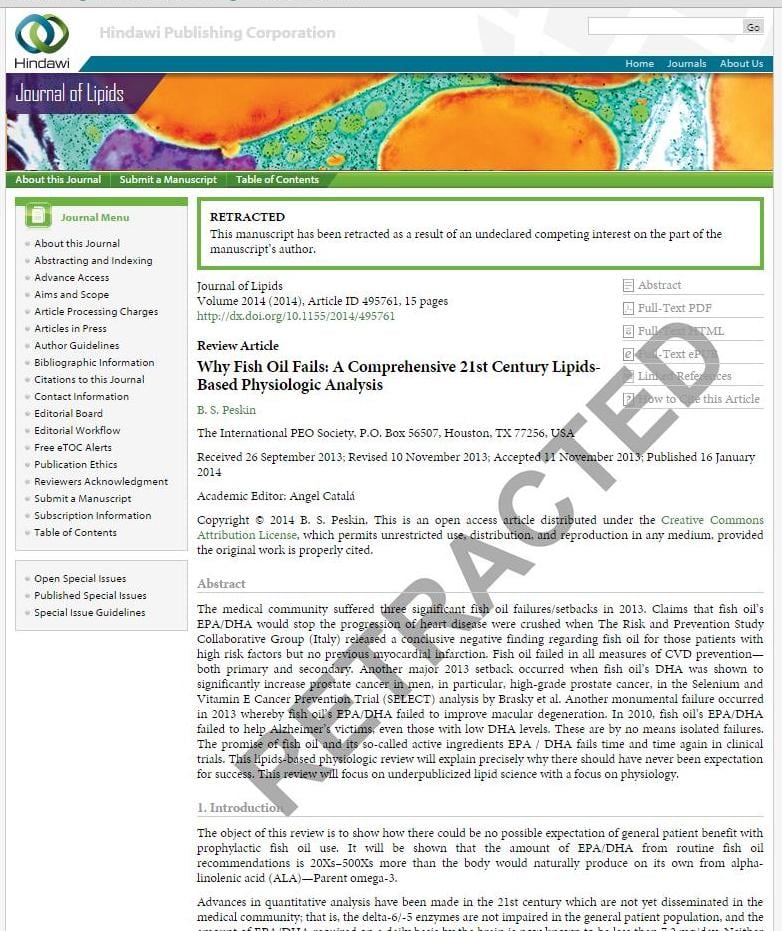The review “Why Fish Oil Fails: A Comprehensive 21st Century Lipids-Based Physiologic Analysis” was retracted by the Journal of Lipids, owned by Egypt-headquartered Hindawi Publishing Corporation as a result of an “undeclared competing interest on the part of the manuscript’s author”.
The paper’s author Brian Peskin wrote: “The promise of fish oil and its so-called active ingredients EPA / DHA fails time and time again in clinical trials. This lipids-based physiologic review will explain precisely why there should have never been expectation for success.”

Peskin does not appear to have any medical credentials but instead holds a bachelor of science in electrical engineering from Massachusetts Institute of Technology (MIT) and was an adjunct professor at Texas Southern University in the Department of Pharmacy and Health Sciences between 1998 and 1999 – where according to his letter of appointment his responsibilities included lecturing on non-prescription and herbal products as well as nutritional components of the school’s curriculum.
However it was his association with Peskin Pharmaceuticals that led to the retraction. The firm was behind a number of patents including one for a medicament for treatment of cancer and other diseases and a treatment of cancer, cardiovascular diseases and inflammation, products that could be in direct competition with fish oils and which he did not declare in his paper.
Confessions of an omega-3 gainsayer
Ian Garber, a final-year medical resident at the University of British Columbia, flagged his concerns to the journal’s editor a few months ago, which resulted in an investigation and its final negation. He told the blog Retraction Watch that his “pseudoscience sense” was pricked by the paper’s heavy bias, logical errors, wild extrapolations and its seeming attempt to impress the reader with overwhelming and unnecessary detail, not to mention a title he said he would, “expect in marketing, not biochemistry”.
According to court documents published on the health fraud watchdog site Quackwatch, Peskin paid $100,000 to the state of Texas in 2003 for misrepresenting his credentials and making fraudulent medical claims around his Radiant Health nutrition supplements, manufactured by the now defunct Maximum Efficiency Products which he founded in the 80s.
Peskin did not respond to our request for comment in time for the publication of this article, but responded to this separate fraud case on his website.
Risking faith in science?
Paul Peters, chief strategy officer for Hindawi which publishes over 400 academic journals, told us he did not think the incident would damage its reputation or more broadly reader confidence in peer-reviewed journals. “I believe that the fact that there is a system in place for journals to investigate concerns that are raised, and if necessary to retract the article in question, is one of the primary strengths of scholarly journals.”
Meanwhile, vice president of regulatory and scientific affairs at the Global Organization for EPA and DHA Omega-3s (GOED), Harry Rice, told us it was happy to see the paper retracted, but noted the issue of “inflammatory headlines” promoting such questionable research.
“Unfortunately, the retraction won't receive as much media attention from the popular press as the original article,” he said.

Whistleblower Ian Garber raised the point that the journal had a pay-to-publish model, but Anthony Almada, CEO of nutrition firm Vitargo Global Sciences and nutrition researcher, said this model was neither new nor inherently problematic, saying some highly reputable journals like the Journal of Biological Chemistry also required payment to publish.
“The weakness is not in the pay-to-publish model, but in the application of the editorial review process, its rigour and standards.”
Senior research director and CEO of the US nutrition consultancy firm AIBMR Life Sciences, Dr Alexander Schauss, said he was “dismayed” with the publication of such a flawed paper – which he said missed out key pieces of compelling evidence on the safety and health benefits of fish oil - although he was not surprised as he had predicted this kind of event in his recent article in Nutritional Outlook.
In his article he warned the industry to the dangers of un-peer reviewed or poorly reviewed papers.
“Imagine a company relying on such a paper to make a claim in the marketplace and then upon it when receiving regulatory scrutiny.”
The best restaurants have a dress code
Yet Almada said the upper tier journals were effective in swiftly rejecting, “diatribe and fodder”.
“The best journals are doing just fine, but like the best restaurants, the wait to get a table, or a reservation, is notably longer than lesser dining establishments. Also, the best restaurants have a dress code.”
But he said that even the editorial board of these top journals did not have time to vet conflict of interest disclosure forms, and he said background checks were unheard of. In the case of a review, a subject expert is normally assigned.
He added: “The enchantment of stakeholders with a ‘peer-reviewed study’ eclipses the far more important, more esoteric questions: How robust is the study design, how did they analyse the data, and who did the study?”
